Inside DBS Newsletter |
August 2011 |
Table of Contents
- District 2 Students Get a Special Visit
- Robinson Named New DOE Commissioner
- Frydenborg Named Senior Management Analyst
- Mallini named new Training Coordinator
- Personnel Actions
- District 9 Welcomes Dolores Nino
- District 11 Extends Welcome to Aragon
- Smarter Than Smart!
- Miami Lighthouse Students Shine in Braille Literacy
- Life Prep University 2011
- Tennis for the Blind or Visually Impaired?
- Pathways to Career Exploration
- How I View Life
- Lunch and Learn Hurricane Awareness
- The Customer Services Section
- New Media Lab and Published Author
- In-service Training Day at VIP
- Benefits of Training
- End Zone
Spotlight
District 2 Students Get a Special Visit
By JoAnn Carrin

On July 28, students at the Lighthouse for the Big Bend Summer Transition Program were excited to welcome Education Commissioner John Winn for an afternoon visit. Commissioner Winn talked with the students about his experiences in high school as the only student with a visual impairment and some of the methods he used to handle difficult situations. The students shared stories of their own and also talked about what they had learned during the summer transition.
Robinson Named New DOE Commissioner
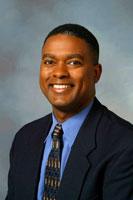 On June 21, Florida's State Board of Education (SBE) unanimously voted to select Gerard Robinson as the state’s next Education Commissioner. Mr. Robinson previously served as the Commonwealth of Virginia's Secretary of Education where he advised the Governor in the development and implementation of education policy.
On June 21, Florida's State Board of Education (SBE) unanimously voted to select Gerard Robinson as the state’s next Education Commissioner. Mr. Robinson previously served as the Commonwealth of Virginia's Secretary of Education where he advised the Governor in the development and implementation of education policy.
Mr. Robinson is the former President of the Black Alliance for Education Options and has also served as the Program Director and the Principal Investigator. He taught fifth grade in Los Angeles, Calif., and was a graduate Instructor at the University of Virginia and Piedmont Virginia Community College. He is a graduate of Howard University and earned his master's degree from Harvard University.
Frydenborg Named Senior Management Analyst
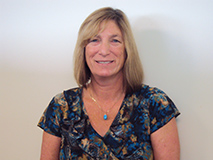 Robin Frydenborg Robin Frydenborg recently joined the Division of Blind Services (DBS) as a Senior Management Analyst II working with the Deputy Division Director. She will be working across DBS bureaus and other organizational units to provide project management support, to coordinate and facilitate the Division’s Strategic Plan, to coordinate audit responses, and to assist the Director and Senior Management Team with priority issues and projects.
Robin Frydenborg Robin Frydenborg recently joined the Division of Blind Services (DBS) as a Senior Management Analyst II working with the Deputy Division Director. She will be working across DBS bureaus and other organizational units to provide project management support, to coordinate and facilitate the Division’s Strategic Plan, to coordinate audit responses, and to assist the Director and Senior Management Team with priority issues and projects.
She has more than 25 years of service in state government, beginning in the Office of the Auditor General, and then working with the Easter Seal Rehabilitation Center. She also worked for a private company to develop and implement a training program for Vocational Rehabilitation clients. She most recently worked for the Department of Children and Families in the Office of Information Technology aligning employee educational needs with departmental initiatives.
Mallini named new Training Coordinator
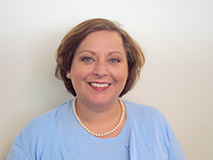 Aimee Mallini joins the Division of Blind Services as our Training Coordinator. Her diverse job responsibilities include coordination and development of trainings for DBS employees. She brings with her many years of training experience.
Aimee Mallini joins the Division of Blind Services as our Training Coordinator. Her diverse job responsibilities include coordination and development of trainings for DBS employees. She brings with her many years of training experience.
Prior to coming to DBS, she served as a Program Consultant for the Office of Safe Schools with the Department of Education. She also served as the Youth Advocacy Coordinator for the Department of Health’s Tobacco Prevention and Control Program. In addition to Florida, Aimee has held positions in state agencies in Mississippi and South Carolina. Aimee’s career spans more than 16 years of service to state and non-profit agencies.
Personnel Actions
We’d like to welcome our newest employees to the DBS family:
- Gregory Coon - General Services Specialist at the Orlando Office
- Rachel Jacobs - Senior Rehabilitation Specialist – Blind at the St. Petersburg Office
- April Ogden - Senior Rehabilitation Specialist - Blind at the Jacksonville Office
- Carlos Montas - Senior Rehabilitation Specialist – Blind at the Daytona Office
- Carol Stuart - OPS Senior Clerk at the Library in Daytona
Congratulations to the following employees who received promotions:
- Melody Kauffman - Library Technical Assistant I at the Library in Daytona
- Jeffrey Whitehead - Rehabilitation Services District Administrator - Blind SES at the Tampa Office
- Sue Velasco - Rehabilitation Supervisor Blind – SE at the Orlando Office
- Charles Simon - Senior Clerk at the Library in Daytona
Articles of Interest
District 9 Welcomes Dolores Nino
Dolores Nino joined the District 9 staff as a Customer Service Specialist. Dolores was previously at the Heartland Workforce Board, where she was involved with job development and job placement activities. She will be working with both the Ft. Myers and Bradenton offices. She is also knowledgeable about the programs in Desoto and Highlands counties. Additionally, she is bilingual, which will be of great assistance to many of our clients.
District 11 Extends Welcome to Aragon
 Eva Aragon began her position as an Administrative Secretary on July 5. Previously she worked in Jacksonville at the Division of Vocational Rehabilitation, and was the office manager at the Deaf Service Bureau before that. In reference to her vast experience working with people with disabilities, Eva said:
“First, I worked with the deaf for 24 years, then with all kinds of disabilities in vocational rehabilitation, and now I’m working with the blind, specifically,” The DBS office in Fort Lauderdale is happy to have Eva join their team.
Eva Aragon began her position as an Administrative Secretary on July 5. Previously she worked in Jacksonville at the Division of Vocational Rehabilitation, and was the office manager at the Deaf Service Bureau before that. In reference to her vast experience working with people with disabilities, Eva said:
“First, I worked with the deaf for 24 years, then with all kinds of disabilities in vocational rehabilitation, and now I’m working with the blind, specifically,” The DBS office in Fort Lauderdale is happy to have Eva join their team.
Smarter Than Smart!
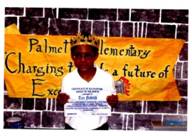 How would you feel if, at almost three years old, you were kept back in preschool with younger children? Smart or confident? Not likely! I met Tien at this point in his life. He was adorable, with curly brown hair, a shy smile, and politeness to spare. Tien would avoid anything that involved using vision.
How would you feel if, at almost three years old, you were kept back in preschool with younger children? Smart or confident? Not likely! I met Tien at this point in his life. He was adorable, with curly brown hair, a shy smile, and politeness to spare. Tien would avoid anything that involved using vision.
Tien was diagnosed with Optic Nerve Hypoplasia (loss of detailed vision and peripheral vision). He also had Nystagmus (problems seeing clearly). Appropriate learning materials help compensate for the vision loss. Tien was held back because he lacked toilet and eating skills. He couldn’t distinguish the clear toilet water from the white bowl. Solution: use a product to make the toilet bowl water blue. He couldn’t see the white oatmeal in the white bowl. Solution: provide high contrast eating materials. Soon Tien joined his age group.
“You’re my teacher, Ms. Susan. You always make me feel safe. I love you,” he said. I knew he was ready to learn. He started saying “Sure, I can.” Over the next two years, Tien learned to use adapted materials and optical aids to learn pre-academic play, and self care skills. On the last day that I assessed him, he asked me to call his mommy. He said, “Tell her I’m super dooper Spiderman Smart!” I asked him how smart that was, and he replied, “I’m smarter than smart, and gooder than good!” My assessment placed Tien at, or above, age level for school entry. He entered kindergarten, loves all aspects of school, and is very successful.
Miami Lighthouse Students Shine in Braille Literacy
By Virginia Jacko, President & CEO
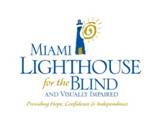 Marino Flores, 11, is a sixth grader at W.R. Thomas Middle School in Miami-Dade County, who scored a 5, the highest level for reading, on the Florida Comprehensive Assessment Test. Preparation for the test is taken seriously by students, who work closely with teachers of the visually impaired. Marino is self-motivated, determined, and practices his Braille skills every day. His mother said, “Marino is a very good Braille reader thanks to the curriculum at Miami Lighthouse, and we focus on the skills they have taught him at home.” Mariano has studied Braille at the Miami Lighthouse since 2004.
Marino Flores, 11, is a sixth grader at W.R. Thomas Middle School in Miami-Dade County, who scored a 5, the highest level for reading, on the Florida Comprehensive Assessment Test. Preparation for the test is taken seriously by students, who work closely with teachers of the visually impaired. Marino is self-motivated, determined, and practices his Braille skills every day. His mother said, “Marino is a very good Braille reader thanks to the curriculum at Miami Lighthouse, and we focus on the skills they have taught him at home.” Mariano has studied Braille at the Miami Lighthouse since 2004.
 Another high-scoring FCAT student is Juan Pablo “J.P.” Paniagua, an 11-year-old sixth grader at Palmetto Middle School in Miami-Dade County. He was recently the first place winner of the South Florida Regional Braille Challenge, and went on to participate in the national contest in Los Angeles on June 25th. The rigorous contest included reading comprehension, Braille speed and accuracy, proofreading, spelling and reading tactile charts and graphs. Only 60 finalists, the top seven percent out of 855 contestants from 41 states and three Canadian provinces who took the preliminary Braille Challenge competed in Los Angeles. J.P. says he loves going to the South Florida Braille Challenge every year and was very excited to make it to the finals in Los Angeles. He has been working on his Braille skills at Miami Lighthouse for the Blind since 2003.
Another high-scoring FCAT student is Juan Pablo “J.P.” Paniagua, an 11-year-old sixth grader at Palmetto Middle School in Miami-Dade County. He was recently the first place winner of the South Florida Regional Braille Challenge, and went on to participate in the national contest in Los Angeles on June 25th. The rigorous contest included reading comprehension, Braille speed and accuracy, proofreading, spelling and reading tactile charts and graphs. Only 60 finalists, the top seven percent out of 855 contestants from 41 states and three Canadian provinces who took the preliminary Braille Challenge competed in Los Angeles. J.P. says he loves going to the South Florida Braille Challenge every year and was very excited to make it to the finals in Los Angeles. He has been working on his Braille skills at Miami Lighthouse for the Blind since 2003.
For print-impaired students taking the reading portion of the FCAT exam, Braille is the only alternative. In other words, if a visually-impaired student cannot read print, they need to have excellent Braille skills. For those who do not, passing the reading portion of the FCAT is impossible. While a one year exemption might be granted by the Department of Education, ultimately passing the FCAT reading section is required. Students who are unable to pass the reading section cannot get a standard diploma, and may not be able to pursue higher education to become the next blind teacher, attorney, or so much more. The Miami Lighthouse for the Blind and Visually Impaired is committed to reinforcing Braille literacy skills that are acquired in our public schools. We are proud of the performance of our students taking the exam in Braille.
Life Prep University 2011
By Kim Pawling and Dylan Buhain
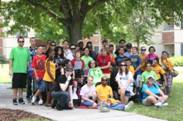 The Transition students, ages 14 to 22, at the Lighthouse Central Florida gathered beneath the large oak tree, laughing, smiling and waiting for the photographer to take their group picture. Their week at Life Prep University was finished. They represent many races, cultures, and socioeconomic statuses, males and females, short and tall. Most important, each believed that he or she was more independent today than the day he or she arrived.
The Transition students, ages 14 to 22, at the Lighthouse Central Florida gathered beneath the large oak tree, laughing, smiling and waiting for the photographer to take their group picture. Their week at Life Prep University was finished. They represent many races, cultures, and socioeconomic statuses, males and females, short and tall. Most important, each believed that he or she was more independent today than the day he or she arrived.
The tree was important, representing growth, learning, and independence. The tree was the central location between the girls and boys dorm, and where the students’ journeys of independence began. Forty-two students came to the university campus. The students were escorted to the large oak tree.
Now this sounds like a normal summer camp registration anywhere, but one important piece of information was left out. All 42 students are visually impaired. Retinal degeneration, albinism, cataracts, glaucoma, etc., are familiar words in the students’ vocabulary. Often, students hear sighted individuals saying, “You can’t do that, because you’re blind,” or “Here let me do that for you.” From July 6 to 12, however, the phrase, “You can’t”, does not exist.
The students lived in the dorm at Lake Claire Apartments on the university campus. They went to their work experiences, cooked, cleaned, shopped, traveled, and participated in a variety of classes, including ballroom dancing. On July 6, these students walked down the side walk afraid of the unknown. On July 12th, they stood beneath the oak tree with smiles on their faces; the new friendships they had made, and a level of confidence that could not be purchased but earned – applause for the students who participated in Life Prep University.
Tennis for the Blind or Visually Impaired?
By Kathleen Peck
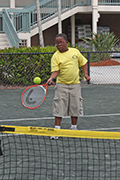 YES! The Lighthouse of Collier's 2nd annual camp introduced the kids to tennis. Lighthouse of Collier reached out over the pond to the British Tennis Foundation for guidance and the audible foam tennis balls. For the majority of blind and visually-impaired young people, this was their first opportunity to access tennis or any racquet sport. The audible foam ball makes a massive difference by making it possible for the young people to locate the ball on the court by the sound it makes.
YES! The Lighthouse of Collier's 2nd annual camp introduced the kids to tennis. Lighthouse of Collier reached out over the pond to the British Tennis Foundation for guidance and the audible foam tennis balls. For the majority of blind and visually-impaired young people, this was their first opportunity to access tennis or any racquet sport. The audible foam ball makes a massive difference by making it possible for the young people to locate the ball on the court by the sound it makes.
The game is played with short tennis racquets and an audible foam ball which is slightly larger than a tennis ball and has a table tennis ball at its center containing ball bearings which cause the ball to rattle. Other adaptations include the server asking their opponent if they are ready, and calling out ‘play’ when the ball is served. A visually impaired player can have two bounces before hitting a return, or three bounces if they are a totally blind player. The scoring is the same as in mainstream tennis. Families are now able to include their visually impaired children in a racquet sport along with their sighted siblings. Thank you to Kevin Walker, Tennis Pro, and all the staff at the Arthur L. Allen Tennis Center for making the day a swinging success! Visit www.tennisfoundation.org.uk or www.lighthouseofcollier.org for more information.
Pathways to Career Exploration
By Christina Panczak-Smith and Sam Patterson
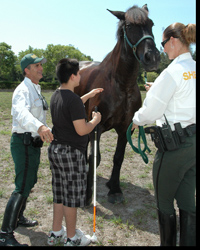 On June 21, the District 10 Division of Blind Services office conducted the second annual Pathways to Career Exploration for their transition students. The blueprint for the annual event is to tour a business, learn firsthand from those who perform the jobs, and the skills required to have a career in their industry. Our first event was sponsored by the hotel industry – this year’s event highlighted Law Enforcement. Our Host was the Palm Beach County Sheriff’s Office.
On June 21, the District 10 Division of Blind Services office conducted the second annual Pathways to Career Exploration for their transition students. The blueprint for the annual event is to tour a business, learn firsthand from those who perform the jobs, and the skills required to have a career in their industry. Our first event was sponsored by the hotel industry – this year’s event highlighted Law Enforcement. Our Host was the Palm Beach County Sheriff’s Office.
The day began with 11 students from the Transition Program meeting at the District 10 Office. Some students were transported by family members, while others used para-transit services. Prior to our departure, each student was asked about their career goals and plans for their future. The results revealed a diverse group of young people with a full spectrum of career dreams – accountant, actor, lawyer, musician and teacher. After the career discussion concluded, we informed the group that our destination was to visit the facilities of the Palm Beach County Sherriff’s Office, and to explore the different career opportunities in law enforcement.
Our group had an opportunity to be introduced to the following areas of the Sheriff’s department operations: the Mounted Unit, the Canine Unit, the Command Center Mobile Unit, the Highway Patrol, 911 Dispatch and Operators, Information Technology, and Human Resources. The participants had an opportunity to learn about the assortment of areas and skills required to run a law enforcement department.
The day concluded with students returning to our DBS office, and recapitulating all the events that had taken place. All of the students involved enjoyed their day, and it was truly a confidence booster as well as a learning experience. All the students are looking forward to next year's activity already -- Cruise ship anyone?
How I View Life
By Kai Peters
 “Ladies and gentlemen,” blurted the spokesman. “Please give it up for the Blue Angels!”
“Ladies and gentlemen,” blurted the spokesman. “Please give it up for the Blue Angels!”
This is part of a dream I’ve had all my life and never stopped trying to achieve. Perseverance is one of the things I’ve learned in life through experience. One of the biggest experiences took place this summer.
I was contacted by the Lighthouse of Central Florida in late May of 2011. I attended their work experience and independent living classes. I observe students like me and how they get past their difficulties in life. This gave me new insight on how to achieve my goals. I learned things to help make life a little easier. This helped me to believe in myself, and I was given the opportunity to put what I learned into practice.
Another life changing experience I have had was when I joined JROTC. I learned how to be a leader via military teaching and ethics. ROTC changed my view from that of a kid, to an adult. When surrounded by adults and military I must act appropriately to maintain my job and position.
All in all, the more experience you have, the better life will be. I have learned so much from my JROTC program and the Lighthouse. The most important thing I’ve learned is that life will throw you obstacles, and it’s your decision to let them hit you or to overcome them and keep pressing forward.
Lunch and Learn Hurricane Awareness
By Sandra Martin, Marketing Representative
On the third Monday of each month, the Visually Impaired Persons of South West Florida host a Lunch ‘N Learn for clients (past and present), staff, and the general public. It is an educational and fun time for all. Everyone brings their own bag lunch and has the opportunity to listen to a guest speaker and socialization.
The June topic was Hurricane Preparedness and Awareness. The guest speakers were, Gerald Campbell and Debbie Quimby from the Lee Count Emergency Operations Center. They gave precise information on hurricane awareness and preparedness. Additionally, their answers to the many questions were a great reminder of the importance of being prepared for a hurricane.
There were 28 attendees and everyone commented that they took with them something that they needed to be reminded of to be as safe as possible during the hurricane season. As we are busy with the many tasks of the day, please take a moment to make sure your hurricane kit is replenished with everything that you may need. If you have not put a kit together yet, please do as soon as possible. If you need any assistance with this, contact the Red Cross or one of the many organizations that have this information. Hurricane season begins in June and ends in November. Be safe and above all be wise in preparing ahead of time.
Future Lunch ‘N Learn topics will include banking and money management and
Enhanced Vision Low-Vision Technology Day.
The Customer Services Section
By Dorothy Minor
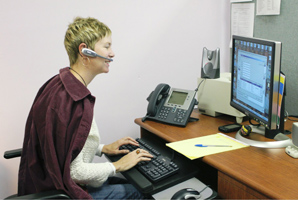 Members of the Customer Services Section are the ears and voice of the Library. Eight staff members listen and interact with customers every day over the phone and in person. This contact creates a sense of mission and purpose in everyone who works in this section. Reader Advisors, Margie and Desarae process applications for Library services for new customers. New customers are assigned to a Reader Advisor by the first letter of their last name. A Reader Advisor calls each new customer to orient them to the service and answer any questions they may have about the service. After their orientation a customer can call and speak to any of the Reader Advisors for help in selecting books, machine problems, change of addresses, transfers, and temporary or permanent stops.
Members of the Customer Services Section are the ears and voice of the Library. Eight staff members listen and interact with customers every day over the phone and in person. This contact creates a sense of mission and purpose in everyone who works in this section. Reader Advisors, Margie and Desarae process applications for Library services for new customers. New customers are assigned to a Reader Advisor by the first letter of their last name. A Reader Advisor calls each new customer to orient them to the service and answer any questions they may have about the service. After their orientation a customer can call and speak to any of the Reader Advisors for help in selecting books, machine problems, change of addresses, transfers, and temporary or permanent stops.
In August, the Library will add a Reader Advisor who is a native speaker of Spanish and is also fluent in English. Bruny, her nickname, will be taking the Spanish language calls for customers who prefer to speak in Spanish. Marcel, a professional librarian and supervisor of this section, is the expert on BARD, the program in which books can be downloaded from the internet on to the customer’s computer and read using a Victor Stream Reader. Diane, the other professional librarian in this section, handles reference questions and also helps customers over the phone. Katherine, Angie, and Marcia are also Reader Advisors and Kathleen, the clerical assistant, rounds out the section.
New Media Lab and Published Author
By McKernan, Bryan
The Pensacola District 1 Office would like to thank Cedric Haynes, Whitney Paine, and Cynthia Lyons for their diligent work to create a media lab. The lab will help participants complete their phone calls for the Employment Outcomes Professional job placement program, and practice using software.
Congratulations go to Margaret Sieboldt on the publication of her book, Sound Talks. The book is a heartwarming biography of a young, blind woman who uses the sounds around her as landmarks as she travels. This book is the first in what Margaret plans to be a seven book series, as she has six additional books awaiting publication. Visit http://dorrance.stores.yahoo.net/soundtalks.html for additional information.
In-service Training Day at VIP
By Sandy Martin
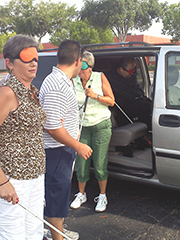 On May 23, staff meeting at the Visually Impaired Persons of SW FL (VIP) was a real “eye opener” for participants. The meeting began with sighted staff members being voluntarily blindfolded. This was an unforgettable experience of navigating through an ordinary day as their blind and visually impaired co-workers do.
On May 23, staff meeting at the Visually Impaired Persons of SW FL (VIP) was a real “eye opener” for participants. The meeting began with sighted staff members being voluntarily blindfolded. This was an unforgettable experience of navigating through an ordinary day as their blind and visually impaired co-workers do.
The drill was coordinated by VIP instructors included a number of mobility situations in the course of an average day such as crossing streets and riding the fixed bus route, preparing lunch and last, but not least, working in the technology lab. Over the course of the day a keen sense of the skill required to maneuver in the dark became apparent. The serious challenges took participants beyond the external environment to awareness of their own attitudes and those of their visually impaired colleagues when put to such tests.
Linn Higgins, Executive Assistant, said “Thanks to all of the instructors who gave us this opportunity for their patience and guidance. I learned so much and it was an experience I will never forget.” Margaret Ruhé Lincoln, Director of Operations, said, “I will not soon forget the lessons you taught us about what it means to be blind. I learned a great deal about myself and how trust plays a role in navigating the world as a blind person.” Allison Leone, Director of Marketing, summed up everyone’s sentiment when she said, “It was an amazing experience and thank you for all the staff that coordinated the day.”
The bottom-line for sighted staff members was a more realistic understanding of challenges faced by blind and visual impaired citizens.
Benefits of Training
By Cheri Undheim
Counselors and staff from Districts 3 and 4 met in Gainesville for training. This provided the first opportunity for many employees to meet and get to know each other. The Jacksonville office used their new state vehicle for the first out of town training. The training was beneficial for all. Jacksonville staff was welcomed by the Gainesville staff, who also made recommendations for local restaurants.
Thanks to Gainesville office staff for their hospitality, and a special thanks to the training team which included Beth Crain, Walter Blackmon and Wayne Jennings from Tallahassee. They made this a wonderful opportunity to get to know our co-workers as well as learn how to be more effective in our respective jobs.
End Zone
We hope you found this month’s newsletter interesting. Remember, we need your submissions each month. Let us know what’s going on in your district or facility. The publication date for the Inside DBS newsletter is the first of each month. The deadline for submissions is the 24th of each month. Comments, suggestions, and submissions should be directed to:
Ashley Evans
Email: Ashley.Evans@dbs.fldoe.org
Phone: 850-245-0310
Additional useful links and telephone numbers:
To request a Braille version of this edition of Inside DBS may contact the Braille and Talking Book Library at al.peterson@dbs.fldoe.org or call 800-226-6075.
MIS Help Desk:
Phone: 850-245-0360
Email: DBS.HelpDesk@dbs.fldoe.org
AWARE Help Desk:
Phone: 850-245-0395 or 1-866-841-0912
Email: Aware.support@dbs.fldoe.org
DBS Division of Blind Services (external): https://dbs.fldoe.org
Correction: In the May edition of Inside DBS we misspelled the name of new employee Dolores Nino, Customer Services Specialist in Fort Myers.
